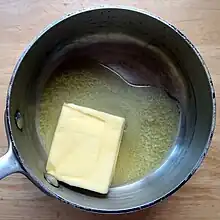< Reconstruction:Proto-Turkic
Reconstruction:Proto-Turkic/sōgun
Proto-Turkic
Etymology
From *sōg (“onion”) + *-gun comparable to Proto-Mongolic *soŋ-gana (“onion”).
Nishanyan suggets that its ultimate origin is uncertain and that Middle Persian سوخ (sôx) probably comes from the same source, (whence also Old Armenian սոխ (sox)).
Brockelmann instead suggets a derivation *soy- (“to peel”) + *-gun.
Declension
Declension of *sōgun
| Singular 3) | |
|---|---|
| Nominative | *sōgun |
| Accusative | *sōgunnï, *sōgunug 4), *sōgunnïg 1) |
| Genitive | *sōgunnïŋ |
| Dative | *sōgunka |
| Locative | *sōgunta |
| Ablative | *sōguntan |
| Allative | *sōgungaru |
| Instrumental 2) | *sōgunun |
| Equative 2) | *sōgunča |
| Similative 2) | *sōgunlayu |
| Comitative 2) | *sōgunlugu |
1) Possibly in Pre-Proto-Turkic.
2) The original instrumental, equative, similative & comitative cases have fallen into disuse in many modern Turkic languages.
3) Plurality is disputed in Proto-Turkic. See also the notes on the Proto-Turkic/Locative-ablative case and plurality page in Wikibooks.
4) Found in the Old Turkic era.
2) The original instrumental, equative, similative & comitative cases have fallen into disuse in many modern Turkic languages.
3) Plurality is disputed in Proto-Turkic. See also the notes on the Proto-Turkic/Locative-ablative case and plurality page in Wikibooks.
4) Found in the Old Turkic era.
Descendants
- Oghur:
- Chuvash: сухан (suh̬an)
- → Eastern Mari: шоган (šogan)
- → Udmurt: сугон (sugon)
See also
| Foods - *yẹ̄miĺčler, *yẹ̄miĺčsāyïn | |||||
|---|---|---|---|---|---|
 Barley |
barley: *arpa |
Pea |
beans, peas: *burčak |
 Wheat |
farro, wheat: *bugday |
|
Jujube |
jujube: *yidge |
 Strawberry |
strawberry: *yidgelek |
Apple |
apple: *almïla |
Hazelnuts |
hazelnut: *bōńurï |
Walnuts |
walnut: *yaŋgak |
 Honey |
honey: *bạl |
|
Millet |
millet: *tạrïg |
 Onion |
onion: *sōgun |
Salt |
salt: *tūŕ |
 Egg |
egg: *yumurtka |
 Butter |
butter: *yāg |
 Mushroom |
mushroom: *kömbe |
|
Radish |
radish: *turp, *turma |
Carrot |
carrot: *turma | ||
References
- al-Kashgarî, Mahmud (1072–1074) Besim Atalay, transl., Divanü Lûgat-it-Türk Tercümesi [Translation of the “Compendium of the languages of the Turks”] (Türk Dil Kurumu Yayınları; 521) (in Turkish), 1985 edition, Ankara: Türk Tarih Kurmu Basımevi, published 1939–1943, page 409
- al-Kashgarî, Mahmud (1072–1074) Besim Atalay, transl., Divanü Lûgat-it-Türk Tercümesi [Translation of the “Compendium of the languages of the Turks”] (Türk Dil Kurumu Yayınları; 521) (in Turkish), 1985 edition, volume I, Ankara: Türk Tarih Kurmu Basımevi, published 1939–1943, page 409
- Tekin, Talât (1995) Türk Dillerinde Birincil Uzun Ünlüler [Primary Long Vowels in Turkic Languages] (Türk Dilleri Araştırmaları Dizisi; 13), Ankara: T.C. Kültür Bakanlığı, →ISBN, page 178
- Clauson, Gerard (1972) “so:ğun”, in An Etymological Dictionary of pre-thirteenth-century Turkish, Oxford: Clarendon Press, page 812
- Levitskaja, L. S., Blagova, G. F., Dybo, A. V., Nasilov, D. M., Pocelujevskij, Je. A. (2003) Etimologičeskij slovarʹ tjurkskix jazykov [Etymological Dictionary of Turkic Languages] (in Russian), volume VII, Moscow: Vostočnaja literatura, page 296
- Tenišev E. R., editor (1984–2006), Sravnitelʹno-istoričeskaja grammatika tjurkskix jazykov: [Comparative Historical Grammar of Turkic Languages:] (in Russian), Moscow: Nauka, page 141
- Räsänen, Martti (1969) Versuch eines etymologischen Wörterbuchs der Türksprachen (in German), Helsinki: Suomalais-ugrilainen seura, page 425
- Starostin, Sergei, Dybo, Anna, Mudrak, Oleg (2003) “*sogan”, in Etymological dictionary of the Altaic languages (Handbuch der Orientalistik; VIII.8), Leiden, New York, Köln: E.J. Brill
- Nişanyan, Sevan (2002–) “soğan”, in Nişanyan Sözlük
This article is issued from Wiktionary. The text is licensed under Creative Commons - Attribution - Sharealike. Additional terms may apply for the media files.